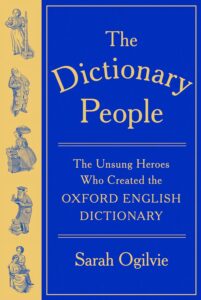The Dictionary People: The Unsung Heroes Who Created the Oxford English Dictionary – Sarah Ogilvie
 The Dictionary People: The Unsung Heroes Who Created the Oxford English Dictionary. By Sarah Ogilvie. (New York: Knopf, 2023. pp. 370. Cloth, $30.00.)
The Dictionary People: The Unsung Heroes Who Created the Oxford English Dictionary. By Sarah Ogilvie. (New York: Knopf, 2023. pp. 370. Cloth, $30.00.)
The Dictionary People is an enjoyable book that takes the reader on a tour of the writing of the Oxford English Dictionary (OED) by exploring the lives of the people who contributed. Ogilvie describes it as a product that the editors of the (OED) crowdsourced to hundreds of people around the world. These contributors read a variety of works to track down new words and their etymologies and then submitted them for inclusion to the OED. Some contributors provided thousands of submissions all on their own, but Ogilvie also gives space to those who may have contributed less words but presented more fascinating portraits.
This book would be great for an undergraduate class on how to write history. Ogilvie spends some time in the introduction detailing her sources, and a bit about her methods. Ogilvie does real historical sleuthing to discover the biographies of those included in her book, and her fortuitous discovery of editor James Murray’s address book and detailed notes therein lays bare how sometimes historical research is all about serendipity. But these detailed descriptions of research method fall by the wayside as her narrative progresses. I wish she had talked more about the methods she used to discover extensive biographical information about her subjects. That would make this book a perfect teaching tool.
The other thing that confused me a bit was how exactly the Oxford English Dictionary worked as an artifact in and of itself. Her descriptions of the OED do not include much information on what made up the OED, where they idea for it came from, and even how editors turned submissions into entries. Ogilvie does not clarify how those who submitted were chosen or self-selected. I also struggled to determine if contributors picked their own books to read from, or if Murray or another editor assigned the books. I know in many cases Murray sent books to the contributors to read, but Ogilvie did not make it clear if that was always the case. She may have made these choices because these subjects already discussed at length in The Professor and the Madman, but I don’t know if that’s the case, as I have not read that book.
This book is a light read, an enjoyable example of popular history done right. We as professional historians have something to learn from Ogilvie’s research methods and her ability to write popular history and make important contributions to historical methodology.
